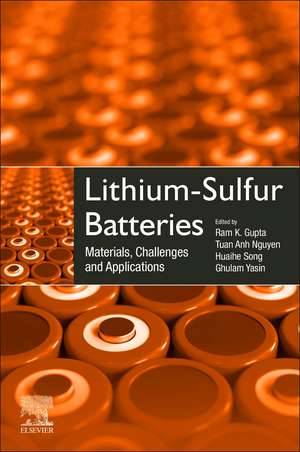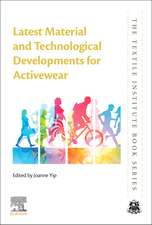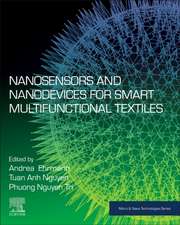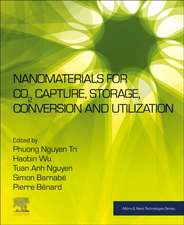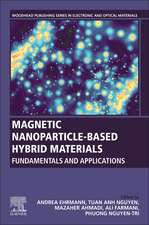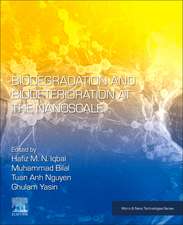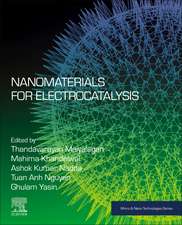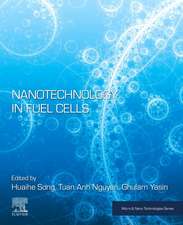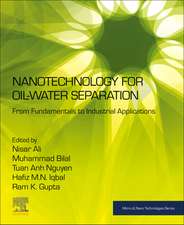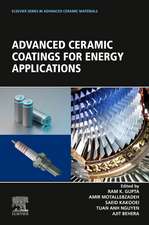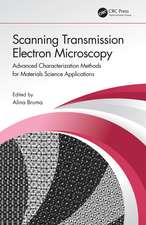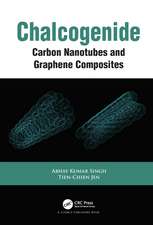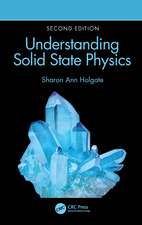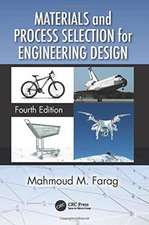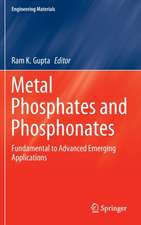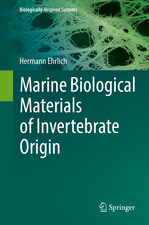Lithium-Sulfur Batteries: Materials, Challenges and Applications
Editat de Ram K. Gupta, Tuan Anh Nguyen, Huaihe Song, Ghulam Yasinen Limba Engleză Paperback – 5 mar 2022
- Covers the state-of-the-art progress on materials, technology, and challenges for lithium-sulfur batteries
- Presents novel synthetic approaches, characterizations, and applications of nanostructured and 2D nanomaterials for energy applications
- Provides fundamentals of electrochemical behavior and their understanding at nanoscale for emerging applications in lithium-sulfur batteries
Preț: 1135.90 lei
Preț vechi: 1486.04 lei
-24% Nou
Puncte Express: 1704
Preț estimativ în valută:
217.35€ • 226.93$ • 179.89£
217.35€ • 226.93$ • 179.89£
Carte tipărită la comandă
Livrare economică 29 martie-12 aprilie
Preluare comenzi: 021 569.72.76
Specificații
ISBN-13: 9780323919340
ISBN-10: 0323919340
Pagini: 708
Ilustrații: 200 illustrations (100 in full color)
Dimensiuni: 152 x 229 x 43 mm
Greutate: 0.93 kg
Editura: ELSEVIER SCIENCE
ISBN-10: 0323919340
Pagini: 708
Ilustrații: 200 illustrations (100 in full color)
Dimensiuni: 152 x 229 x 43 mm
Greutate: 0.93 kg
Editura: ELSEVIER SCIENCE
Cuprins
PART 1: BASIC PRINCIPLES
1. Introduction to electrochemical energy storage technologies
2. A recent development in Li-S batteries
3. Chemistry and operation of Li–S batteries
4. High-performance Lithium-Sulfur batteries: Role of nanotechnology and nanoengineering
5. Mathematical modeling of Li–S batteries
6. Nanomaterials for advanced Li-S batteries: An introduction
7. Nanocomposites for binder-free Li-S electrodes
8. Separators for Li–S batteries
9. Progress and Perspective of separators towards high-performance lithium sulfur batteries
10. Electrolytes for Li–S batteries
PART 2: NANOMATERIALS AND NANOSTRUCTURES FOR SULFUR CATHODES
11. Porous carbon-sulfur composite cathodes
12. Recent advancement on nanocomposites of carbon / sulfur electrodes for lithium sulfur (Li-S) batteries
13. Advances in nanomaterials for sulfurized carbon cathodes
14. Graphene-sulfur composite cathodes
15. Nanocomposites of graphene-sulfur as cathode materials and separators for Li-S batteries
16. Graphene-sulfur nanohybrids for cathodes in Li-S batteries
17. Metal-organic framework-based cathode materials in Li-S batteries
18. MXene-based sulfur composite cathodes
19. Polymeric nanocomposites for Li-S batteries
20. Design of nanostructured sulfur cathodes for high-performance lithium-sulfur battery
21. Nanostructured additives and binders for sulfur cathodes
PART 3: LITHIUM METAL ANODES: MATERIALS AND TECHNOLOGY
22. Metallic Li anode: An introduction
23. Advanced carbon-based nanostructured framework for Li anodes
24. Carbon-based anode materials for lithium-ion batteries
PART 4: APPLICATIONS AND FUTURE PERSPECTIVES
25. Li-S batteries for marine applications
26. Two-dimensional layered materials for flexible electronics and batteries
27. Sustainability in Li–S batteries
28. Recyclability and recycling technologies for lithium-sulfur batteries
29. Recyclability, circular economy, and environmental aspects of Lithium-sulfur batteries
1. Introduction to electrochemical energy storage technologies
2. A recent development in Li-S batteries
3. Chemistry and operation of Li–S batteries
4. High-performance Lithium-Sulfur batteries: Role of nanotechnology and nanoengineering
5. Mathematical modeling of Li–S batteries
6. Nanomaterials for advanced Li-S batteries: An introduction
7. Nanocomposites for binder-free Li-S electrodes
8. Separators for Li–S batteries
9. Progress and Perspective of separators towards high-performance lithium sulfur batteries
10. Electrolytes for Li–S batteries
PART 2: NANOMATERIALS AND NANOSTRUCTURES FOR SULFUR CATHODES
11. Porous carbon-sulfur composite cathodes
12. Recent advancement on nanocomposites of carbon / sulfur electrodes for lithium sulfur (Li-S) batteries
13. Advances in nanomaterials for sulfurized carbon cathodes
14. Graphene-sulfur composite cathodes
15. Nanocomposites of graphene-sulfur as cathode materials and separators for Li-S batteries
16. Graphene-sulfur nanohybrids for cathodes in Li-S batteries
17. Metal-organic framework-based cathode materials in Li-S batteries
18. MXene-based sulfur composite cathodes
19. Polymeric nanocomposites for Li-S batteries
20. Design of nanostructured sulfur cathodes for high-performance lithium-sulfur battery
21. Nanostructured additives and binders for sulfur cathodes
PART 3: LITHIUM METAL ANODES: MATERIALS AND TECHNOLOGY
22. Metallic Li anode: An introduction
23. Advanced carbon-based nanostructured framework for Li anodes
24. Carbon-based anode materials for lithium-ion batteries
PART 4: APPLICATIONS AND FUTURE PERSPECTIVES
25. Li-S batteries for marine applications
26. Two-dimensional layered materials for flexible electronics and batteries
27. Sustainability in Li–S batteries
28. Recyclability and recycling technologies for lithium-sulfur batteries
29. Recyclability, circular economy, and environmental aspects of Lithium-sulfur batteries
